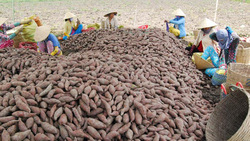 As Vietnamese farmers can only earn 3 million dong per 1000 hectares of rice field, they would rather lease land to Chinese for 4-5 million dong.
As Vietnamese farmers can only earn 3 million dong per 1000 hectares of rice field, they would rather lease land to Chinese for 4-5 million dong.VietNamNet | 11 July 2011
Chinese lease Vietnamese land to grow sweet potatoes
VietNamNet Bridge – Not only collecting sweet potatoes in Vietnam, Chinese have also been coming to Vietnam, leasing land to grow sweet potatoes to export to third countries.
Sweet potato growers in Binh Tan district in Vinh Long province are hurrying to expand the growing area to over 6000 hectares. When the prices of Japanese violet sweet potatoes climb to 16,950 dong per kilo, more than a half of the total 93,758 local residents in Binh Tan, who have been relying on sweet potatoes, have been packaging potatoes to carry to China.
Though the farmers well understand that China is a risky market, they still decide to export products to China, because they have no other choice.
The game of chance
More than 70 percent of the sweet potatoes output in Binh Tan and Binh Minh districts are exported. Every month, 10,000 tons of sweet potatoes are exported, mostly to China, across the border.
Chinese so favor Japanese violet sweet potatoes, that they not only try to collect potatoes in Vietnam, but they have also come to Vietnam where they lease land to grow potatoes. There are at least 10 workshops in Binh Tan and Binh Minh which specialize in collecting and packaging products with Chinese labels.
Of the three kinds of sweet potatoes, Japanese violet potatoes can bring highest incomes. While white and milky potatoes can bring 100-120 million dong per hectare in income, lower than Japanese violet potatoes which can bring 170-200 million dong per hectare.
Vo Van Theo, Head of the Binh Tan District’s Agriculture Division, said that sweet potato is the second most important farm produce, after rice.
“However, farmers sometimes have been put at disadvantages when they export products across the border,” Theo said. “The problem is that farmers do not have good knowledge about the export markets and they do not know what to do when facing troubles”.
A businessman in Binh Minh district said that in all cases, Chinese have a hold over Vietnamese farmers. “We have to carry potatoes to the border gates and deliver products through the border gates,” he said.
Huynh Ngoc Pho, who was once a Japanese sweet potato grower and has established a trade company, said that if farmers do not well know the steps they need to follow, they may become penniless.
“Hearing that the potato price climbed to 16,000-17,000 dong per kilo, our farmers ploddingly carried potatoes to the border gates to sell. However, at that time, Chinese businessmen forced the purchase prices down to 12,000 dong and then to 11,000 dong per kilo,” Pho said.
“They (Chinese merchants) accept to pay deposit, so that Vietnamese farmers carry potatoes to the border gates. However, they will make a volte-face and refuse to purchase the products, if they see many Vietnamese farmers getting stuck at the border gates,” he continued. “In such cases, Vietnamese farmers would have to bargain away”.
Pho went on to say that the State should take necessary measures to help farmers expand the markets for sweet potatoes, so as to help farmers sell products at better prices. Since China now remains the only market, Vietnamese farmers do not have many choices.
Chinese grow sweet potatoes on Vietnamese land
According to FAO, China is the biggest sweet potato producer, putting out 105 million tons a year out of the total output of 127 million tons worldwide. However, China only has potatoes in August, September and October, while it has to import potatoes in the remaining months.
Chinese have leased land in Thuan An commune in Binh Minh district at 4-5 million dong per 1000 square meters to grow sweet potatoes. As Vietnamese farmers can only earn 3 million dong per 1000 hectares of rice field, they would rather lease land to Chinese for 4-5 million dong.
There have been no official statistics about the area of land leased to Chinese, because the land plots are in the names of local residents, according to Phan Thi Be, Head of the Economics Division of Binh Minh district.
Source: SGTT













